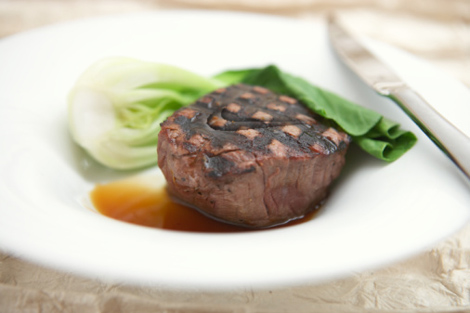
Free Lunch
By Katie KohnPhoto by Diana Kolsky

Imagine a small, efficient soup-and-sandwich cafe that offers innovative, globally inspired cuisine daily at no cost to the customer. The food, lease, utilities and other costs are entirely subsidized by advertisers and corporate sponsors. The cafe would concede to all their conditions concerning placement, content, and medium. Servers are volunteers. The management maintains that it can refuse service to any customer and demonstrates this at all times by imposing a mandatory dress code for all customers wishing to be served. "Free Lunch" should qualify as non-profit organization to take advantage of any tax deductions for the organization and its sponsors.

All other aspects of "Free Lunch" are flexible. The main concept is that it must be the antithesis of two popular enterprises today: the corporate sponsored charity (where companies are good for "good publicity") and the ethical commodity (where companies make goods for "the public good"). With the corporate sponsored charity brand Product (Red), they have merged into one new form of enterprise. We can expect to see more. This is why it is the perfect time to ask what the ramifications are of ethical capitalism. If the ethical capitalist makes profits that benefit others, what does the ethical consumer consume? First, is there even such a thing as ethical consumption? In the world of marketing ploys, yes. This is the noble generation of advertisers. They genuinely want to inform you about the "friendly" or "fair" nature of this or that product so that you'll help them buy for a better tomorrow - a tomorrow which marketing exec and organic pastry chef alike will inhabit. Economically speaking, there are certain types of ethics consumption. It's quite easy to follow: buying is better for the economy. "Goods" are good. The president didn't have to endorse shopping for everyone to know its virtues. Many of us work in sales. But because buying certain goods might be bad for the environment, for our neighbors, our bodies, our children, our pets, our communities, our nation, or even for our culture, the ethics of consumption isn't enough: ethical consumption divides the good goods from the bad goods. Ethical consumption is thus really an ethics of information. The moral responsibilities fall in equal measure to the marketer as informer and the consumer as informant. Being good means informing others and staying informed. This is an ethics that only exists because the marketer does their job well and only works because the consumer defers all responsibility to the marketer. The consumer here seems to be giving up an awful lot. What is s/he getting in return?Once a product has been given the environmentally/animal/child friendly "Green" light, the advertiser can genuinely encourage the consumer to enjoy without consequence. What the ethical consumer enjoys in the calorie-free soda, sugar-free gum, CFC-free hairspray, sweatshop-free cotton T-shirt is not only the refreshing flavor, the sweet taste, the frizz-free hold or the downy softness with vibrant color. They also enjoy the choice itself to do something good, be it for their bodies, the environment, the tsunami victims, the country, the future, etc. The double enjoyment the consumer gets out of the product is both the sublime enjoyment of ethical agency and their lower, selfish enjoyment. The former cancels out the guilt that is always already bound to the latter. They enjoy "guilt-free." The trouble with alleviating the consumer of their guilt is that once their conscience is clear, so is their (social, environmental, etc.) conscientiousness. We have a new way to describe the consciousness of the carefree but well-meaning consumer-citizen that is beginning to populate our civilizations: "awareness." To be aware is to be informed, but not necessarily moved to tears. The voice of conscience is replaced by its echo. The purpose of "Free Lunch" is to restore to the consumer what has been swindled out of them: their guilt. This is why it is necessary to offer to the "ethical consumer," an excessive product which is made at someone else's expense and would benefit the less fortunate even more. Furthermore, it gets the swindler to foot the bill. It uses the marketing industry to do what they do best (to get the consumer to agree to enjoy "like there's no tomorrow") without allowing them to do what they just now learning to do even better (to get the consumer to enjoy without guilt). Just as there is no such thing as enjoyment without guilt, there is also no such thing as a free lunch.
About Blueprints>>


